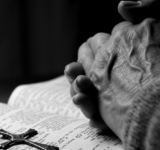Preface to the Book of Concord Paragraphs 22 to the Conclusion
Audio PlayerPastors Donofrio, Hoffman, and Juhl discuss in detail the conclusion of the Preface to the Book of Concord.
With host Rev. Craig Donofrio and guests Rev. Brandt Hoffman of Zion Lutheran Church in Anchorage, Alaska and Rev. David Juhl of Our Savior Lutheran Church in Momence, IL.
—-
22) Besides, this matter is of importance also in this respect, viz., that troublesome and contentious men, who do not suffer themselves to be bound to any formula of the pure doctrine, may not have the liberty, according to their good pleasure, to excite controversies which furnish ground for offense, and to publish and contend for extravagant opinions. For the result of these things, at length, is that the pure doctrine is obscured and lost, and nothing is transmitted to posterity except academical opinions and suspensions of judgment. To these considerations was also added this that, agreeably to the office committed to us by God, we understand that we owe our subjects this, viz., that we should diligently care for the things which pertain to this life and the life to come, and that we should take pains, with the greatest earnestness and to our utmost ability, to attend to those matters which promote the extension of God’s name and glory, the propagation of His Word, (from which alone we hope for salvation,) the peace and tranquillity of churches and schools, and the instruction and consolation of disturbed consciences, especially since it is certainly a settled fact with us that this salutary work of Christian concord has already been longed for and expected with anxious prayers and the greatest desire by many good and sincere men both of the highest and the lowest rank. For from the beginning of this work of peaceful settlement, indeed, we have not been of the opinion, neither are we even now, that this work of concord, which is so salutary and exceedingly necessary, should be removed from the eyes of men, and altogether concealed, and that the light of heavenly truth should be placed under a bushel or table; wherefore we ought in no wise to defer its publication. Nor do we doubt that all the godly who are lovers of the heavenly truth, and of concord pleasing to God, will approve, together with us, of this salutary, useful, godly, and very necessary undertaking, and that they will act so that nothing may be wanting in them, even to the greatest effort, whereby the glory of God and the common welfare in both temporal and eternal things may be promoted.
Conclusion
23) We indeed (to repeat in conclusion what we have mentioned several times above) have wished, in this work of concord, in no way to devise what is new, or to depart from the truth of the heavenly doctrine which our ancestors, renowned for their piety, as well as we ourselves, have acknowledged and professed. We mean that doctrine, which, having been derived from the Prophetic and Apostolic Scriptures, is contained in the three ancient Creeds, in the Augsburg Confession, presented in the year 1530 to the Emperor Charles V, of excellent memory, then in the Apology, which was added to this, in the Smalcald Articles, and lastly in both the Catechisms of that excellent man, Dr. Luther. Therefore we also have determined not to depart even a finger’s breadth either from the subjects themselves, or from the phrases which are found in them, but, the Spirit of the Lord aiding us, to persevere constantly, with the greatest harmony, in this godly agreement, and we intend to examine all controversies according to this true norm and declaration of the pure doctrine. Then, also with the rest of the Electors, Princes, and Deputies of the Holy Roman Empire, and other kings, princes, and magnates of the Christian state, in accordance with the constitution of the Holy Empire, and the agreements which we have with them, we determined and desired to cultivate peace and harmony, and to render to each one, according to his rank, all duties belonging to us, together with the offices of friendship.
24)Besides, having made known our objects, we will also earnestly apply ourselves with great strictness and the most ardent zeal to the defense of this work of concord, by diligent visitations of the churches and schools in our realms, oversight of printing offices, and other salutary means, according to occasions and circumstances which may be offered to ourselves and others. We will also take pains, if either controversies already composed should be renewed, or new controversies concerning religion should arise, to remove and settle them betimes, for the purpose of avoiding offense, without long and dangerous digressions.
25) As a manifest testimony of this, we have with great consent subscribed our names, and attached also our seals:—
Louis, Count Palatine on the Rhine, Elector. Augustus, Duke of Saxony, Elector. John George, Margrave of Brandenburg, Elector. Joachim Frederick, Margrave of Brandenburg, Administrator of the Archbishopric of Magdeburg. John, Bishop of Meissen. Eberhard, Bishop of Luebeck, Administrator of the Episcopate of Werden. Philip Louis, Count Palatine on the Rhine. The guardians of Frederick William and John, Dukes of Saxony. The guardians of John Casimir and John Ernest, Dukes of Saxony. George Frederick, Margrave of Brandenburg. Julius, Duke of Brunswick and Lueneburg. Otho, Duke of Brunswick and Lueneburg. Henry the Younger, Duke of Brunswick and Lueneburg. William the Younger, Duke of Brunswick and Lueneburg. Wolfgang, Duke of Brunswick and Lueneburg. Ulrich, Duke of Mecklenburg. The guardians of John and Sigismund Augustus, Dukes of Mecklenburg. Louis, Duke of Wuerttemberg. The guardians of Ernest and Jacob, Margraves of Baden. George Ernest, Count and Lord of Henneburg. Frederick, Count of Wuerttemberg and Moempelgard. John Gunther, Count of Schwartzburg. William, Count of Schwartzburg. Albert, Count of Schwartzburg. Emich, Count of Leiningen. Philip, Count of Hanau. Gottfried, Count of Oettingen. George, Count and Lord in Castel. Henry, Count and Lord in Castel. Otho, Count of Hoya and Burgkhausen. John, Count of Oldenburg and Delmenhorst. John Hoier, Count of Mansfeld. Bruno, Count of Mansfeld. Hoier Christopher, Count of Mansfeld. Peter Ernest, Jr., Count of Mansfeld. Christopher, Count of Mansfeld. Albert George, Count of Stolberg. Wolfgang Ernest, Count of Stolberg. Louis, Count of Gleichen. Charles, Count of Gleichen. Ernest, Count of Reinstein. Boto, Count of Reinstein. Louis, Count of Lewenstein. Henry, Baron of Limburg, Semperfrei. George, Baron of Schoenburg. Wolfgang, Baron of Schoenburg. Anarc Frederick, Baron of Wildenfels. Mayor and Council of the City of Luebeck. Mayor and Council of the City of Lueneburg. Mayor and Council of the City of Hamburg. Council of the City of Brunswick. Mayor and Council of the City of Landau. Mayor and Council of the City of Muenster in the Gregorian Valley. Council of the City of Goslar. Mayor and Council of the City of Ulm. Mayor and Council of the City of Esslingen. Council of the City of Reutlingen. Mayor and Council of the City of Noerdlingen. Mayor and Council of Rothenburg on the Tauber. Mayor and Council of the City of Hall in Swabia. Mayor and Council of the City of Heilbronn. Mayor and Council of the City of Memmingen. Mayor and Council of the City of Lindau. Mayor and Council of the City of Schweinfurt. Council of the City of Donauwoerth. Chamberlain and Council of the City of Regensburg. Mayor and Council of the City of Wimpffen. Mayor and Council of the City of Giengen. Mayor and Council of Bopfingen. Mayor and Council of the City of Alen. Mayor and Council of the City of Kaufbeuren. Mayor and Council of the City of Isna. Mayor and Council of the City of Kempten. Council of the City of Goettingen. Mayor and Council of the City of Leutkirch. The entire Government of the City of Hildesheim. Mayor and Council of the City of Hameln. Mayor and Councilmen of the City of Hannover. Council of Muehlhausen. Council of Erfurt. Council of the City of Eimbeck. Council of the City of Nordheim.






